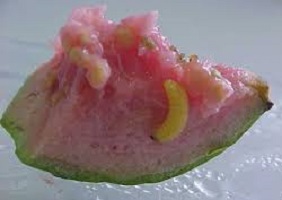Guava Fruit Benefits: Incredible Uses for Guava Leaves
Guava Fruit Benefits: Incredible Uses for Guava Leaves
The tropical fruit guava, which is grown in Venezuela, Mexico, and Colombia, is typically consumed raw or blended into drinks. Its skin and leaves are also used as a natural cure for a variety of ailments. It’s possible that the common belief that guavas cause colds is accurate.

These fruits also offer health advantages. Guava is also beneficial when dealing with serious health issues like diabetes, high blood pressure, diarrhea, coughing, and many cancers. It can even be a part of your diabetes diet plan because it is so beneficial for diabetes.
How then does guava accomplish all of this? Guavas are rich in fibers that serve as antioxidants and vitamin C, to answer your query. These antioxidants tend to lessen or eliminate the negative effects of oxidation.
Common knowledge about guavas
The fruit guava has therapeutic qualities that can aid with a variety of health issues, including blood pressure, diarrhea, and more. These are some essential guava facts for you to be aware of.
- Guavas typically reach a height of 20 feet.
- Guavas have white blossoms.
- There are 100–500 tiny seeds inside each guava fruit, and the fruit only bears fruit twice a year for the first two to eight years after planting. There are some types, nevertheless, that have no seeds.
Vit C, A, and E are abundant in guavas.
- Guava is known as the “super fruit” since it is claimed to have four times the amount of vitamin C, three times the amount of proteins, and four times the amount of fiber of pineapple. Additionally, it’s claimed to contain more potassium than bananas.
- A guava plant can live for at least 40 years; • It is the best weight loss tool; • Its leaves are utilized in the textile industry as a black pigment.
My own experience has led me to believe that guava water extracts may have liver-protective properties. They have been shown to dramatically lower blood levels of bilirubin and increased liver enzymes. The liver may benefit from guava extract’s defensive properties, which would enhance its health and function.
Nutritional facts about guava
Because of its numerous health benefits, guava is referred to be the queen of fruits, if pineapple is the king of fruits. In Florida, guava was initially offered for sale in 1847. In Hawaii, 21 guava cultivators were introduced between 1948 and 1969. The potential for guava trees to perish from a sudden drop in temperature is one of the main threats to the growth of this fruit. Here are some nutritional details about guavas that you should be aware of.
- Guavas have 20% folate, which is beneficial for pregnant women and helps prevent neural tube damage, and 21% vitamin A, which helps preserve mucous membranes and brighten skin.
Pink guavas include lycopene, which is helpful for preventing prostate cancer and shielding skin from UV rays. Guavas also have more potassium than bananas, which helps control elevated blood pressure.
- Guava content per 100 gramsquantity of Calories68 grams of carbohydrates14.32g Fiber and 5.4g Fat2.55g Protein / 0.95g
- 25% of the daily recommended consumption of vitamin C
- Folate12% of the suggested daily consumption
- B5 vitamin9% of the suggested daily consumption
- B6 vitamin8% of the suggested daily consumption
- Niacin less than 7% of the daily required amount
- Magnesiumsix percent of the suggested daily consumption
- Calcium9% of the suggested daily consumption
- Phosphorussix percent of the suggested daily consumption
- The Manganese5% of the suggested daily consumption
Although guava has several health advantages, its consumption should be limited. Fructose, which is present in guavas, has the potential to be toxic if ingested in high concentrations.
According to my observations, guava water extracts may have anti-proliferative effects on KB cells. This indicates that the extracts have the capacity to stop some dangerous cells from proliferating and dividing.

Types of Guavas
While some guava trees grow to a maximum height of 12 feet in cooler climes, most guava trees share comparable traits. Some grown up to 20 feet in warmer regions. The winter months require careful maintenance of guava plants. Nonetheless, guava may be the secret to weight loss for all those workout fanatics. This is a list of the several varieties of guavas.
- Guavas in the pink and red variations
These guavas, also known as desert guavas, are typically pink in color and have a sweet taste. You may find this particular breed of guavas readily in your local market. This is silky and contains less seeds; it’s sold a lot in Hong Kong. This breed is regarded as superior.
- Yellow and white Cloured Guavas
This breed usually has a light, acidic flavor without any scent. When the skin is ripe, it seems green, but the inner layer is a pale white or yellow color. When ripe, this cultivar can also become pink.
Note: Guavas come in a wide range of kinds, but they’re all thought to be nutrient-dense powerhouses.
I have noticed over the years that Psidium guajava, or guava, leaves have a spasmolytic effect. This implies that it may aid in the relief of muscular spasms or uncontrollably contracted muscles. Quercetin, a chemical present in both the plant extract and leaf of the plant, is the primary cause of this action.
Guava Fruit Benefits: Health Benefits of Guava
Because of its great therapeutic significance, guava fruits are referred to as the queen of all fruits. A 100 grams portion of guava fruit has 8.92 grams of sugar and 68 calories. In addition, it has a high calcium content (18 grams of minerals per 100 grams). This indicates that the fruit may help treat a variety of illnesses. However, let’s look at some of the health advantages of guava so that you may have a better understanding of the subject.
- Guava enhances your immune system
According to some reports, guavas have four times the amount of vitamin C that is found in oranges. In order to better equip your body to combat common diseases and viruses, vitamin C helps raise immunity levels. Moreover, increased vitamin C promotes healthy vision.
- Could lower the chance of getting cancer
Antioxidants such as vitamin C, lycopene, and other polyphenols work to counteract infections within the body and stop the development of malignant cells. It has been demonstrated that guava fruit inhibits the growth of breast cancer cells as well as prostate cancer.
- Aids in controlling blood sugar levels
Guavas have a high glycaemic index and fiber content, which helps stop diabetes from developing. You can adjust your diet by using the Glycemic Index Food Chart to determine the GIs of additional foods. The presence of fiber prevents blood sugar spikes, and the glycemic index limits how quickly blood sugar rises.
- Guavas contribute to heart health
Guavas are rich in potassium and sodium, which aid in the body’s balancing and regulation of elevated blood pressure in hypertension sufferers. Guavas assist with lowering cholesterol, which is one of the main causes of heart disease. On the other hand, this fruit raises good cholesterol levels and lowers bad cholesterol.
- Aids in cases of constipation
When compared to other fruits, guavas have a higher than average amount of healthy dietary fiber. A single guava provides 12 percent of the daily recommended consumption of fiber, making it extremely advantageous for digestive health. Additionally, it promotes regular bowel motions. This lowers the possibility of constipation.
- Promotes improved vision
Guava fruit has vitamin A, which improves vision in some people. Consuming guava helps stave off cataracts and macular degeneration in addition to improving vision.
- Guava has anti-stress properties.
Magnesium, which is found in guava fruit, aids in muscle and nerve relaxation. This implies that all it takes to unwind after a demanding workout or a demanding workday is one guava. This fruit gives your system a nice energy boost and aids in the fight against stress.
- Guava benefits expectant mothers
Pregnant women can benefit from guavas since they include folic acid and vitamin B-9, which is advised for women as it aids in the development of the baby’s nervous system and guards against neurological diseases.
- Among the most effective toothache remedies
Guava leaves have anti-inflammatory and antibacterial properties that help combat infections and eradicate germs. Eating guava leaves at home can also help reduce toothaches. It’s also reported that the juice of guava leaves helps with mouth ulcers and sore gums.
- Promotes weight reduction
You should consume guava that promotes weight loss if you enjoy working out or if you feel like you could use some weight loss. The guava plant controls your body’s metabolism. When guava is raw, it’s reported to have less sugar than oranges, grapes, and apples.
- Aids in coughing and colds
When compared to other fruits, guavas have an extremely high iron and vitamin C content. Guava, on the other hand, has been shown to shield you against viral infections and nasty colds. The juice of raw guavas is an excellent remedy for colds and coughs. It clears the throat, lungs, and respiratory tract of mucus and disinfects them.
- Could ease menstrual discomfort
Severe and agonizing cramps are a common period symptom for women. According to a study, guava leaf extract may be able to lessen menstrual pain. In this study, 197 women took 6 mg of guava leaf extract, which was found to be quite helpful in relieving pain and to be more effective than several medicines!
Guava leaf benefits
Western medicine is our go-to solution for minor ailments like fever, colds, coughs, etc. Remember, though, that guava leaves are also incredibly healthful. Guava leaves are quite healthy if the fruit is any indication. These are a few advantages of guava leaves that you should be aware of.
Assists in preventing diarrhea; lowers cholesterol; aids in weight loss; regulates blood sugar; aids in the prevention of cancer; promotes clear vision; treats acne; and enhances the texture of your skin
Note: Guava leaves can be used to make tea or boiled in hot water and eaten. You will gain from both of these in numerous ways.
Guava Fruit Benefits: Guava leaves to promote hair health
An unhealthy scalp leads to hair loss. Guava leaves’ anti-inflammatory, antibacterial, and antioxidant qualities can help prevent hair loss and fortify your scalp. It’s also utilized for dandruff and issues relating to the scalp.
Additionally, it has a lot of vitamin B and C, which nourish and promote hair development. If you happen to have a guava tree in your garden, instead of piling up the leaves or burning them, try making a paste out of them and dabbing it gently onto your scalp. This will fortify your scalp and prevent hair loss.
Guava Fruit Benefits: The advantages of guava leaf tea
If guava leaf tea is as healthful as green tea and has been used in Ayurvedic medicine, you can drink it if you have stomach pain, loose stools, or other health issues. To prepare the guava leaves, simply bring some water to a boil and let it steep for 20 minutes. After that, filter the water and give it five minutes to cool. When you are eating it, make sure it is at least slightly warm. Additionally, you must take this on an empty stomach. After carefully following the instructions, you might experience immediate relief.
Conclusion on Guava Fruit Benefits Guava leaves for flat tummy and weight loss
Guava leaves have gained popularity for their potential health benefits, including aiding in weight loss and promoting a flat tummy. However, it’s important to approach such claims with caution and rely on scientific evidence.
While guava leaves contain various compounds like flavonoids and tannins that may offer health benefits, there’s limited scientific research specifically on their role in weight loss or reducing belly fat. Most of the research on guava leaves focuses on their antioxidant, antimicrobial, and anti-inflammatory properties.
If you’re looking to lose weight or flatten your tummy, it’s essential to focus on overall healthy habits like maintaining a balanced diet, staying physically active, managing stress, and getting enough sleep. Including guava leaves as part of a healthy diet might contribute to your overall well-being, but it’s unlikely to be a standalone solution for weight loss or achieving a flat tummy.
As always, it’s best to consult with a healthcare professional or a registered dietitian before making significant changes to your diet or lifestyle, especially if you have any underlying health conditions or concerns. They can provide personalized advice and guidance tailored to your specific needs and goals.
Guava Fruit Benefits: Guava leaves for fertility
Guava leaves are often considered beneficial for fertility due to their rich nutrient content and potential health properties. While scientific evidence specifically linking guava leaves to improved fertility is limited, they are known to contain antioxidants, vitamins, and minerals that support overall health, including reproductive health.
Some traditional and alternative medicine practices suggest that guava leaves may help regulate menstrual cycles, improve uterine health, and boost fertility in both men and women. However, it’s essential to approach such remedies with caution and consult with a healthcare professional before relying solely on them for fertility issues.
Maintaining a balanced diet, regular exercise, managing stress, and seeking medical advice if experiencing fertility concerns are crucial steps in promoting reproductive health. While guava leaves may have potential benefits, they should be seen as part of a holistic approach to fertility rather than a standalone solution.
Can guava leaves improve fertility?
While guava leaves contain nutrients that support overall health, there’s limited scientific evidence directly linking them to improved fertility. However, some traditional practices suggest they may have benefits for reproductive health.
What nutrients do guava leaves contain?
Guava leaves are rich in antioxidants like flavonoids and polyphenols, as well as vitamins (such as vitamin C) and minerals (like potassium and magnesium), which are important for overall well-being.
How are guava leaves used for fertility?
Some traditional remedies involve consuming guava leaf tea or using guava leaf extracts. It’s believed these methods may help regulate menstrual cycles and support reproductive health, but scientific evidence is lacking.
Are there any risks associated with using guava leaves for fertility?
While guava leaves are generally safe when consumed in moderation as part of a balanced diet, excessive consumption or use of guava leaf supplements may lead to adverse effects. Additionally, it’s crucial to consult with a healthcare professional before relying solely on guava leaves for fertility issues.
What other factors are important for fertility?
Maintaining a healthy lifestyle, including a balanced diet, regular exercise, managing stress, avoiding harmful substances, and seeking medical advice if experiencing fertility concerns, are all important factors in promoting reproductive health.
Are there any studies supporting the use of guava leaves for fertility?
While there is anecdotal evidence and some traditional practices suggesting the benefits of guava leaves for fertility, there is a lack of scientific studies specifically examining this relationship. More research is needed to understand the potential effects of guava leaves on fertility.
Can men benefit from guava leaves for fertility?
Some suggest that guava leaves may have benefits for male fertility as well, potentially due to their antioxidant content. However, there is limited research in this area, and more studies are needed to determine the extent of any potential effects on male reproductive health.
Guava Fruit Benefits: How should guava leaves be prepared for fertility purposes?
Guava leaves can be used to make tea by steeping dried or fresh leaves in hot water. Some also use guava leaf extracts or supplements. However, it’s essential to follow proper preparation methods and dosage guidelines, and it’s advisable to consult with a healthcare professional before using guava leaves for fertility purposes.
Can guava leaves help with specific fertility issues?
While guava leaves are often touted for their potential benefits for overall reproductive health, such as regulating menstrual cycles, there’s limited scientific evidence to support their efficacy for specific fertility issues. Individuals experiencing fertility concerns should seek personalized medical advice and treatment options.
Are there any other natural remedies that may support fertility?
Several natural remedies, such as certain herbs, supplements, and lifestyle changes, are often suggested to support fertility. Examples include acupuncture, herbal supplements like chasteberry and maca root, and maintaining a healthy weight through diet and exercise. However, it’s essential to approach these remedies with caution and consult with a healthcare professional for personalized guidance.


